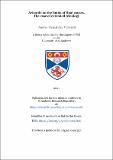Files in this item
Aristotle on the limits of final causes. The case of extended teleology
Item metadata
| dc.contributor.advisor | Broadie, Sarah | |
| dc.contributor.author | Hernández Villarreal, Andrés | |
| dc.coverage.spatial | 170 | en_US |
| dc.date.accessioned | 2024-03-13T16:53:19Z | |
| dc.date.available | 2024-03-13T16:53:19Z | |
| dc.date.issued | 2021-12-01 | |
| dc.identifier.uri | https://hdl.handle.net/10023/29487 | |
| dc.description.abstract | In this thesis, I discuss the concept of Aristotelian extended teleology (i.e., non-theistic teleological causation in which more than one substance is involved). I argue that some passages of Aristotle’s corpus and Theophrastus’ Metaphysics can be read as arguments of extended teleology. To interpret those passages, I introduce the concept of “axiarchism”, according to which X is actual because X is good. The thesis is composed of five chapters. In chapter 1, I introduce both the doctrine of Aristotle’s four causes and the discussion of the reach of final causes according to the second book of the Physics. In chapter 2, I discuss the teleological arguments that can be found in the first book of Aristotle’s Politics. I argue that some of these arguments can be read as arguments for extended teleology. In chapter 3, I argue that it is reasonable to suppose that, for Aristotle, the sublunary is not a random result of the superlunary and that, therefore, there is some form of order in all the parts of the universe. In this chapter, I focus particularly on Physics VIII, Generation and Corruption II 10. In the fourth chapter, I discuss Metaphysics XII. I defend the view that the tenth chapter of book Lambda can be read as an explicit question about the order and unity of all the parts of the world. In chapter 5, I discuss Theophrastus’ Metaphysics. I argue that Theophrastus is pointing towards the need for an account of extended teleology. He claims that not everything can be the result of a final cause, because some natural phenomena (e.g., the rotation of the sun that causes the yearly seasons) cannot be explained in teleological terms. In questioning the possibility of explaining these phenomena in teleological terms, however, Theophrastus is already thinking in terms of extended teleology. | en_US |
| dc.description.sponsorship | "This work was supported by Mexico’s National Council of Science and Technology (Consejo Nacional de Ciencia y Tecnología, CONACYT) under PhD scholarship 265182/440745; and by Mexico’s Secretariat of Education (SEP, Secretaría de Educación Pública)."-- Funding | en |
| dc.language.iso | en | en_US |
| dc.publisher | University of St Andrews | |
| dc.title | Aristotle on the limits of final causes. The case of extended teleology | en_US |
| dc.type | Thesis | en_US |
| dc.contributor.sponsor | National Council of Science and Technology of Mexico | en_US |
| dc.contributor.sponsor | Secretaría de Educación Pública | en_US |
| dc.type.qualificationlevel | Doctoral | en_US |
| dc.type.qualificationname | PhD Doctor of Philosophy | en_US |
| dc.publisher.institution | The University of St Andrews | en_US |
| dc.identifier.doi | https://doi.org/10.17630/sta/820 | |
| dc.identifier.grantnumber | 265182/440745 | en_US |
This item appears in the following Collection(s)
Items in the St Andrews Research Repository are protected by copyright, with all rights reserved, unless otherwise indicated.

